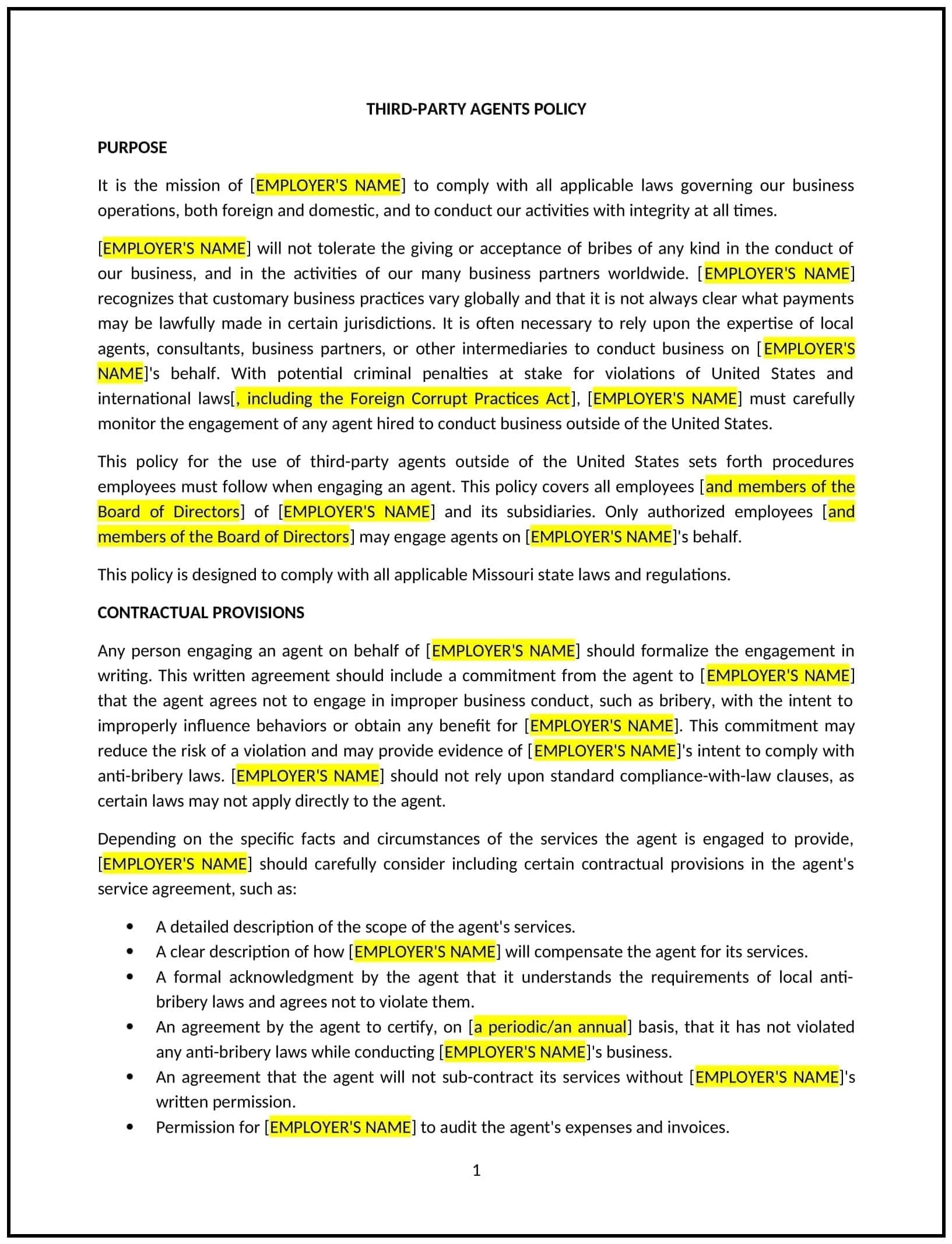Third-party agents policy (Missouri): Free template
Got contracts to review? While you're here for policies, let Cobrief make contract review effortless—start your free review now.

Customize this template for free
Third-party agents policy (Missouri)
A third-party agents policy helps businesses in Missouri establish guidelines for working with third-party vendors, contractors, or agents who act on the company’s behalf. This policy outlines the expectations for third-party agents regarding compliance with company standards, ethical behavior, confidentiality, and legal requirements. It is designed to ensure that third-party agents represent the business fairly, transparently, and in alignment with the company’s values and legal obligations.
By adopting this policy, businesses can reduce risks related to third-party relationships, enhance collaboration, and maintain consistency in the way third-party agents operate on their behalf.
How to use this third-party agents policy (Missouri)
- Define third-party agents: Clearly identify who qualifies as a third-party agent, such as vendors, contractors, consultants, or service providers, and the specific role they play in the business.
- Set expectations for conduct: Outline the behavior expected of third-party agents, including ethical standards, compliance with laws, confidentiality, and respect for the company’s reputation.
- Address compliance with laws and regulations: Ensure that third-party agents comply with all relevant Missouri state laws, federal regulations, and industry standards related to their work with the company.
- Outline confidentiality requirements: Specify the level of confidentiality required when third-party agents have access to proprietary or sensitive information, such as client data, financial details, or intellectual property.
- Establish performance monitoring: Define how the performance of third-party agents will be monitored, including regular audits, assessments, or reviews to ensure that they meet the company’s standards and expectations.
- Set guidelines for contract management: Provide clear guidelines for the contract process, including the terms and conditions to be included in agreements with third-party agents, and the procedures for contract renewal, termination, or modification.
- Define consequences for violations: Outline the actions that will be taken if a third-party agent fails to meet the company’s standards or violates the policy, including possible termination of the relationship, legal action, or financial penalties.
- Review regularly: Periodically review and update the policy to reflect changes in Missouri state laws, federal regulations, or evolving business needs.
Benefits of using this third-party agents policy (Missouri)
This policy provides several benefits for businesses in Missouri:
- Mitigates risks: A clear third-party agent policy helps businesses mitigate risks related to outsourcing, such as legal liability, financial risks, or reputational damage resulting from third-party actions.
- Ensures consistent performance: By setting expectations for performance and compliance, businesses can ensure that third-party agents consistently meet company standards and deliver quality work.
- Protects confidential information: Establishing confidentiality requirements helps protect sensitive business information, preventing unauthorized access, theft, or misuse of data.
- Enhances accountability: By outlining consequences for violations, businesses can hold third-party agents accountable for their actions, ensuring that they adhere to the terms of the agreement.
- Promotes ethical business practices: A third-party agent policy encourages ethical behavior and transparency, ensuring that agents align with the company’s values and operate in a responsible manner.
- Supports legal compliance: The policy helps businesses comply with legal requirements related to third-party relationships, reducing the risk of legal disputes, fines, or penalties.
Tips for using this third-party agents policy (Missouri)
- Communicate the policy clearly: Ensure that all third-party agents are aware of the company’s expectations, including the ethical standards, confidentiality requirements, and compliance obligations outlined in the policy.
- Establish strong contracts: Develop comprehensive contracts that clearly define the terms and conditions of the relationship, including performance metrics, confidentiality provisions, and compliance requirements.
- Monitor performance regularly: Set up regular checks and audits to monitor the performance of third-party agents, ensuring that they consistently meet the agreed-upon standards and comply with legal requirements.
- Provide training and support: Offer training to third-party agents as needed to ensure they understand the company’s standards, legal requirements, and expectations regarding confidentiality and ethical conduct.
- Address issues promptly: If any issues arise, address them quickly and effectively to avoid potential disruptions to business operations, legal challenges, or reputational harm.
- Review regularly: Periodically review and update the policy to ensure it reflects any changes in Missouri state law, industry best practices, or evolving business needs.